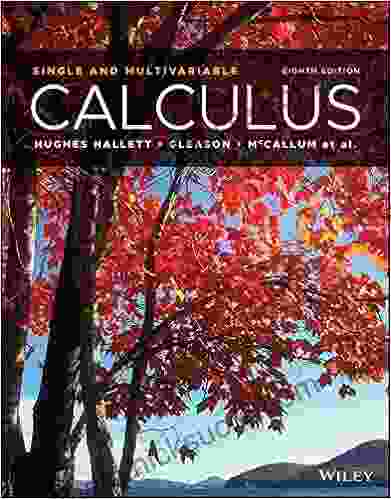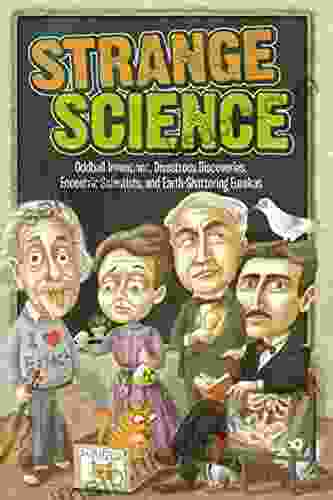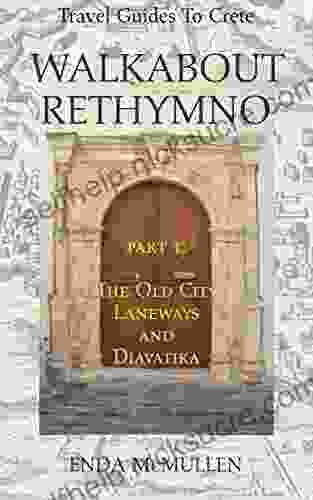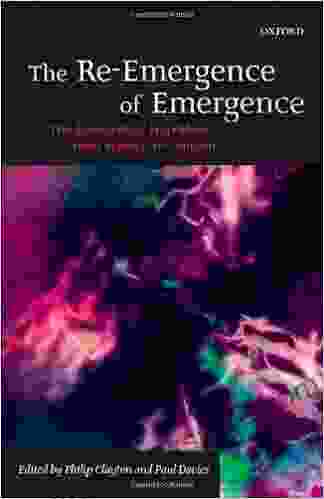The Emergentist Hypothesis: From Science to Religion

The Emergentist Hypothesis is a captivating theory that proposes an intriguing convergence between science and religion. It suggests that as the complexity of a system increases, it can give rise to entirely new and unpredictable properties that cannot be explained solely by the properties of its constituent parts. This groundbreaking concept has sparked profound implications for our understanding of consciousness, spirituality, and the nature of reality.
Science and the Emergentist Hypothesis
Within the scientific realm, the Emergentist Hypothesis has gained significant traction. It offers a compelling framework for understanding complex phenomena that arise in natural systems. For example, the emergence of life from non-living matter or the development of human consciousness from neural activity cannot be fully explained by reducing these phenomena to their underlying physical components.
4.6 out of 5
| Language | : | English |
| File size | : | 3569 KB |
| Text-to-Speech | : | Enabled |
| Screen Reader | : | Supported |
| Word Wise | : | Enabled |
| Print length | : | 344 pages |
| Lending | : | Enabled |
One of the most prominent proponents of the Emergentist Hypothesis is philosopher of mind David Chalmers. In his influential work, "The Conscious Mind," Chalmers argues that consciousness is an emergent property that arises from the complex interactions of the brain's neural networks. He posits that consciousness cannot be explained by physical or computational processes alone but rather requires a higher-order understanding of the mind as a whole.
Religion and the Emergentist Hypothesis
The Emergentist Hypothesis has also found resonance within religious and spiritual traditions. It offers a potential bridge between scientific inquiry and religious belief by suggesting that the sacred and the transcendent may arise from the emergence of higher-order qualities in the natural world.
For instance, some religious thinkers have explored the idea that the divine may emerge from the collective consciousness of humanity or from the interconnectedness of all living beings. This perspective aligns with the Emergentist Hypothesis, which posits that new and unpredictable properties can arise from the interactions of complex systems.
Implications for Consciousness and Spirituality
The Emergentist Hypothesis has profound implications for our understanding of consciousness and spirituality. If consciousness is an emergent property of the brain, it suggests that our subjective experiences cannot be fully reduced to neural activity. This opens up the possibility for a deeper understanding of the mind-body connection and the nature of free will.
Similarly, the Emergentist Hypothesis lends support to the idea that spiritual experiences may arise from the emergence of higher-order qualities in the human psyche. These experiences, which often involve a sense of transcendence or connection with something greater, may be interpreted as manifestations of the emergence of a more profound level of consciousness.
Alternative Perspectives
While the Emergentist Hypothesis has gained significant attention, it is not without its critics. Some philosophers and scientists argue that it is simply a restatement of the problem it seeks to solve. They point out that positing an emergent property does not explain how or why it arises, leaving open the fundamental question of consciousness.
Other alternative perspectives include physicalism, which maintains that all phenomena, including consciousness, can be explained by physical processes alone, and reductionism, which seeks to explain higher-level properties by reducing them to their constituent parts. However, the Emergentist Hypothesis offers a unique perspective that challenges these traditional views.
The Emergentist Hypothesis is a provocative and thought-provoking theory that explores the intricate relationship between science and religion. It suggests that as systems grow in complexity, they can give rise to new and unpredictable properties that cannot be fully explained by their underlying components. This hypothesis has far-reaching implications for our understanding of consciousness, spirituality, and the nature of reality, inviting us to consider the possibility that the sacred and the transcendent may emerge from the depths of our own existence.
4.6 out of 5
| Language | : | English |
| File size | : | 3569 KB |
| Text-to-Speech | : | Enabled |
| Screen Reader | : | Supported |
| Word Wise | : | Enabled |
| Print length | : | 344 pages |
| Lending | : | Enabled |
Do you want to contribute by writing guest posts on this blog?
Please contact us and send us a resume of previous articles that you have written.
 Fiction
Fiction Non Fiction
Non Fiction Romance
Romance Mystery
Mystery Thriller
Thriller SciFi
SciFi Fantasy
Fantasy Horror
Horror Biography
Biography Selfhelp
Selfhelp Business
Business History
History Classics
Classics Poetry
Poetry Childrens
Childrens Young Adult
Young Adult Educational
Educational Cooking
Cooking Travel
Travel Lifestyle
Lifestyle Spirituality
Spirituality Health
Health Fitness
Fitness Technology
Technology Science
Science Arts
Arts Crafts
Crafts DIY
DIY Gardening
Gardening Petcare
Petcare Emenwa Global
Emenwa Global Greg Gatz
Greg Gatz Sonia Mainstone Cotton
Sonia Mainstone Cotton Aylette Jenness
Aylette Jenness Darja Wagner Ph D
Darja Wagner Ph D Lori Foster
Lori Foster Nancy Friday
Nancy Friday Karen Whitley Bell
Karen Whitley Bell Terry Marsh
Terry Marsh William Woys Weaver
William Woys Weaver Madelynne Diness Sheehan
Madelynne Diness Sheehan David Code
David Code Thane K Pratt
Thane K Pratt Ron Dalby
Ron Dalby Peter Levin
Peter Levin Hourly History
Hourly History Inga Aksamit
Inga Aksamit Linda West
Linda West Lew Freedman
Lew Freedman Bob Weeks
Bob Weeks Dean Karnazes
Dean Karnazes Marc Kery
Marc Kery Steve Oakes
Steve Oakes Jens Voigt
Jens Voigt Elizabeth M Ward
Elizabeth M Ward William M Kelso
William M Kelso Kristin Fontichiaro
Kristin Fontichiaro Jessica S Olson
Jessica S Olson Gabriel Gambetta
Gabriel Gambetta Tom Rea
Tom Rea Tori Bortman
Tori Bortman Christopher Burris
Christopher Burris Brett Ortler
Brett Ortler Martin Rees
Martin Rees Ernestine Gilbreth Carey
Ernestine Gilbreth Carey Beverly Bell
Beverly Bell Ken Phillips
Ken Phillips Richard Strozzi Heckler
Richard Strozzi Heckler Lyn Millner
Lyn Millner Danny Staple
Danny Staple Stewart M Green
Stewart M Green Kjell Erik Rudestam
Kjell Erik Rudestam Mark Baker
Mark Baker Temple Bailey
Temple Bailey Matt Wallaert
Matt Wallaert Austin Ruse
Austin Ruse Larry Miller
Larry Miller Susan F Paterno
Susan F Paterno Lisa Gache
Lisa Gache Ben Riggs
Ben Riggs Patrick Holford
Patrick Holford Nfhs
Nfhs Gary D Wale
Gary D Wale Seth Kantner
Seth Kantner Carol Ann Rinzler
Carol Ann Rinzler Darryl Cunningham
Darryl Cunningham Jeffrey Freed
Jeffrey Freed E Randolph Richards
E Randolph Richards Picabo Street
Picabo Street Kay Harris Kriegsman
Kay Harris Kriegsman Rick Burgess
Rick Burgess Paul Bodine
Paul Bodine Manly P Hall
Manly P Hall Conrad Anker
Conrad Anker Aspen Matis
Aspen Matis Roy Benaroch Md
Roy Benaroch Md Hugh Acheson
Hugh Acheson Asia Citro
Asia Citro Richard Miles
Richard Miles Fred Provenza
Fred Provenza Don Casey
Don Casey Tony Clunn
Tony Clunn Audrey Sutherland
Audrey Sutherland Robert Chuckrow
Robert Chuckrow Nic Stone
Nic Stone Karl Fulves
Karl Fulves Siddhartha Mukherjee
Siddhartha Mukherjee John S Ahlquist
John S Ahlquist Lilith Dorsey
Lilith Dorsey Joanne Simon Walters
Joanne Simon Walters Eitan Bar
Eitan Bar Jonothan Page
Jonothan Page John Updike
John Updike John Littleford
John Littleford Julia Albu
Julia Albu Avery Faigenbaum
Avery Faigenbaum Liz Carmack
Liz Carmack David J Miklowitz
David J Miklowitz Denny Emerson
Denny Emerson Judith Z Kallenbach
Judith Z Kallenbach Clive Finlayson
Clive Finlayson Augustus M Walton
Augustus M Walton Barbara Blitzer
Barbara Blitzer Lois Lowry
Lois Lowry Greg B Smith
Greg B Smith Sam Pathy
Sam Pathy Paul Tukey
Paul Tukey Wilfrid Jonson
Wilfrid Jonson Mandy Khoshnevisan
Mandy Khoshnevisan John Gray
John Gray Sarah Boslaugh
Sarah Boslaugh Kathy Hirsh Pasek
Kathy Hirsh Pasek Autumn Carpenter
Autumn Carpenter Antoni Porowski
Antoni Porowski Ethan Gallogly
Ethan Gallogly Alan Vermilye
Alan Vermilye Charles D Garvin
Charles D Garvin George Orwell
George Orwell Kathy Pike
Kathy Pike Carl Safina
Carl Safina Nancy Owens Barnes
Nancy Owens Barnes Vance Packard
Vance Packard Steve Colgate
Steve Colgate Martins Zaumanis
Martins Zaumanis Maureen Connolly
Maureen Connolly Jeff Szuhay
Jeff Szuhay Jessica Nordell
Jessica Nordell James Garbarino
James Garbarino Edward Lee
Edward Lee Rajeev Lal
Rajeev Lal Deanna Pecaski Mclennan
Deanna Pecaski Mclennan Lawrence A Kane
Lawrence A Kane Gaby Melian
Gaby Melian Kira Breed Wrisley
Kira Breed Wrisley Joe Friel
Joe Friel Simon Pridmore
Simon Pridmore Vb Leghorn
Vb Leghorn Colleen Hoover
Colleen Hoover Jayme Adelson Goldstein
Jayme Adelson Goldstein Brent Dykes
Brent Dykes Nsca National Strength Conditioning Association
Nsca National Strength Conditioning Association James Ori
James Ori Ellyn Sanna
Ellyn Sanna Larry Olmsted
Larry Olmsted Audrey Coulthurst
Audrey Coulthurst Conrad Goeringer
Conrad Goeringer Mami Wata
Mami Wata Robert M Bramson
Robert M Bramson Gary Webster
Gary Webster Robert E Howard
Robert E Howard Asiphile Qulu
Asiphile Qulu Jerome D Smalls
Jerome D Smalls Leonard Mlodinow
Leonard Mlodinow J A Baker
J A Baker Brent Runyon
Brent Runyon Lizzie Lane
Lizzie Lane Ken Fry
Ken Fry Luca Caioli
Luca Caioli Collins Dictionaries
Collins Dictionaries Paul Parsons
Paul Parsons Aubrey Hargis
Aubrey Hargis Daffodil Campbell
Daffodil Campbell Catherine Belknap
Catherine Belknap Jeff Vandermeer
Jeff Vandermeer Vasily Mahanenko
Vasily Mahanenko Shepherd Mead
Shepherd Mead Lindsey Philpott
Lindsey Philpott Ken Denmead
Ken Denmead James Ladyman
James Ladyman Emily Whaley
Emily Whaley Esther M Toddler
Esther M Toddler Laurie Katz
Laurie Katz Laurie Kennedy Malone
Laurie Kennedy Malone Audre Lorde
Audre Lorde Drew Harris
Drew Harris Gabrielle Bossis
Gabrielle Bossis R Scott Thornton
R Scott Thornton Brooke Dojny
Brooke Dojny Hillary Davis
Hillary Davis Augustine Wetta
Augustine Wetta Lore M Dickey
Lore M Dickey Beverly Conyers
Beverly Conyers Dory Willer
Dory Willer Mark Coeckelbergh
Mark Coeckelbergh Randi Kreger
Randi Kreger Katie Cotugno
Katie Cotugno Matt Forbeck
Matt Forbeck Cornelia Pelzer Elwood
Cornelia Pelzer Elwood Dr Jerisa Berry
Dr Jerisa Berry Gareth Loy
Gareth Loy Justine Kerfoot
Justine Kerfoot Joe Ryder
Joe Ryder Leslie T Chang
Leslie T Chang Robert T Clemen
Robert T Clemen Sarah B Bush
Sarah B Bush Alan Lightman
Alan Lightman Janet Gurtler
Janet Gurtler E W Bullinger
E W Bullinger Marie Rutkoski
Marie Rutkoski Dan Blanchard
Dan Blanchard Foster Provost
Foster Provost Michael Grimm
Michael Grimm George J Hademenos
George J Hademenos Larry Gonick
Larry Gonick Nick Fragel
Nick Fragel Ed Jaworowski
Ed Jaworowski Larry Hart
Larry Hart Staff Of The Harvard Crimson
Staff Of The Harvard Crimson Tim Muehlhoff
Tim Muehlhoff Jeannie Burlowski
Jeannie Burlowski Greg Lavern
Greg Lavern Norman Ollestad
Norman Ollestad Lise Eliot
Lise Eliot Steve Bisheff
Steve Bisheff Babu The Panda
Babu The Panda Peggy Kaye
Peggy Kaye Bruno Barnhart
Bruno Barnhart Fred Mitchell
Fred Mitchell Peter Gieler
Peter Gieler Renzo Gracie
Renzo Gracie Brian Christian
Brian Christian Conor Sullivan
Conor Sullivan Kathy Jackson
Kathy Jackson Joe Baird
Joe Baird Audrey Grey
Audrey Grey Bradley Stone
Bradley Stone Larry Dane Brimner
Larry Dane Brimner Dk Eyewitness
Dk Eyewitness David Landis
David Landis David Acheson
David Acheson Richard Ferber
Richard Ferber Steven Rinella
Steven Rinella Loren W Christensen
Loren W Christensen Adam Parkinson
Adam Parkinson Hilary Scarlett
Hilary Scarlett Rena Ejiogu
Rena Ejiogu E Paul Zehr
E Paul Zehr Barry Cunliffe
Barry Cunliffe Mark Parman
Mark Parman Bill Thorness
Bill Thorness C M Gray
C M Gray Blake Dresden
Blake Dresden Linda Wong
Linda Wong Kindle Edition
Kindle Edition Robert Simons
Robert Simons Deanna Roy
Deanna Roy Jim Collins
Jim Collins The Car Crash Detective
The Car Crash Detective Lamis Chebbi
Lamis Chebbi Catherine Rodgers
Catherine Rodgers John Skinner
John Skinner Arthur Benjamin
Arthur Benjamin G R S Mead
G R S Mead Tomasz Witkowski
Tomasz Witkowski Dana Wechsler Linden
Dana Wechsler Linden Terasa Cooley
Terasa Cooley Qukids
Qukids James Feess
James Feess Jerry Scott
Jerry Scott Fran Zimniuch
Fran Zimniuch Dk
Dk N West Moss
N West Moss Katie Hoff
Katie Hoff Johny Pitts
Johny Pitts Stephen Morris
Stephen Morris Casey Barber
Casey Barber Jessica Seinfeld
Jessica Seinfeld Jacqui Letran
Jacqui Letran Tracy Deonn
Tracy Deonn John Connor
John Connor Debora Rasio
Debora Rasio Nathan Clark
Nathan Clark Leigh Pearson
Leigh Pearson Richard Boergers
Richard Boergers Stan Fischler
Stan Fischler Spike Walker
Spike Walker Mike Eruzione
Mike Eruzione Nina W Brown
Nina W Brown Mike Doyle
Mike Doyle Gillian Bradshaw
Gillian Bradshaw Lucy Hopping
Lucy Hopping Karen Berger
Karen Berger Todd Mikkelsen
Todd Mikkelsen Sara Zarr
Sara Zarr Vicki Hoefle
Vicki Hoefle Bernie Chowdhury
Bernie Chowdhury Bob Smale
Bob Smale Jonathan Cane
Jonathan Cane John Austin
John Austin Mia Baxter
Mia Baxter Leonard Susskind
Leonard Susskind Laura A Roser
Laura A Roser Moon Travel Guides
Moon Travel Guides Maya Angelou
Maya Angelou Dougald Macdonald
Dougald Macdonald Darren Palmer
Darren Palmer Harry Bauld
Harry Bauld Nita Sweeney
Nita Sweeney Ryan Sleeper
Ryan Sleeper Barbara Oakley Phd
Barbara Oakley Phd Scott Turansky
Scott Turansky Tarik Unal
Tarik Unal Paul Oliver
Paul Oliver Chloe Lukasiak
Chloe Lukasiak Aubre Andrus
Aubre Andrus Keith Mcnulty
Keith Mcnulty Deborah Falaye
Deborah Falaye Janis B Meredith
Janis B Meredith Don Orwell
Don Orwell Heather Heying
Heather Heying Dusty Phillips
Dusty Phillips Lisa Fain
Lisa Fain Yang Jwing Ming
Yang Jwing Ming Ervin Laszlo
Ervin Laszlo Rudy Sanchez
Rudy Sanchez Smadar Lavie
Smadar Lavie Lara Lillibridge
Lara Lillibridge Miriam Manela
Miriam Manela Izabelle Winter
Izabelle Winter Zhi Gang Sha
Zhi Gang Sha Susan M Sheridan
Susan M Sheridan Ayn Rand
Ayn Rand John Sharp
John Sharp Uta C Merzbach
Uta C Merzbach Jennifer Love
Jennifer Love Gabriela Rosa
Gabriela Rosa Don J Sharpsteen
Don J Sharpsteen Ben Sasse
Ben Sasse Kevin Kelly
Kevin Kelly Robert Warden
Robert Warden Proprietary Edition Kindle Edition
Proprietary Edition Kindle Edition Mike Mastracci
Mike Mastracci Timothy J Jorgensen
Timothy J Jorgensen Deborah T Goldberg
Deborah T Goldberg Eric S Raymond
Eric S Raymond Jermaine Marshall
Jermaine Marshall Pete Whittaker
Pete Whittaker Ori Hofmekler
Ori Hofmekler Prayer M Madueke
Prayer M Madueke Reinhard Bonnke
Reinhard Bonnke Rehan Haider
Rehan Haider Sandy Hall
Sandy Hall Dustin Hansen
Dustin Hansen Dan Morse
Dan Morse Deborah Miller
Deborah Miller Joe Kelsey
Joe Kelsey Vivian Sandau
Vivian Sandau William Schoolcraft
William Schoolcraft Mercedes Lackey
Mercedes Lackey Robert W Sullivan Iv
Robert W Sullivan Iv Sharon Baranoski
Sharon Baranoski Madeleine Roux
Madeleine Roux Rachel Mitchell
Rachel Mitchell Babatunde Peter
Babatunde Peter Quick Reads
Quick Reads Gerald Paul Clifford
Gerald Paul Clifford Athena P Kourtis
Athena P Kourtis Gail M Nelson
Gail M Nelson Ethan Sawyer
Ethan Sawyer Florin Grancea
Florin Grancea Samantha Bongeka Nqoko
Samantha Bongeka Nqoko Patricia L Thompson
Patricia L Thompson Deborah J Rumsey
Deborah J Rumsey Dave Ramsey
Dave Ramsey Austa Somvichian Clausen
Austa Somvichian Clausen Peter Bronski
Peter Bronski Claire Nance
Claire Nance Print Replica Kindle Edition
Print Replica Kindle Edition Levison Wood
Levison Wood Chris Santella
Chris Santella Linda Dobson
Linda Dobson Suzanne Jurmain
Suzanne Jurmain Roger Lajoie
Roger Lajoie Efrain Galeano
Efrain Galeano Karen Skerrett
Karen Skerrett Mike Kim
Mike Kim Marc D Lewis
Marc D Lewis John Misha Petkevich
John Misha Petkevich Paul Pilkington
Paul Pilkington Chris Burkard
Chris Burkard Patricia Stacey
Patricia Stacey Yogi Ramacharaka
Yogi Ramacharaka Tiffany Wasson
Tiffany Wasson Bubba Watson
Bubba Watson Kathleen M Eisenhardt
Kathleen M Eisenhardt Shelly Rainforth Collins
Shelly Rainforth Collins Kevin Bales
Kevin Bales Huw Price
Huw Price Jim Fay
Jim Fay Carolyn Wyman
Carolyn Wyman Eric Jones
Eric Jones James Nestor
James Nestor Tony Nester
Tony Nester Fennel Hudson
Fennel Hudson Richard H Immerman
Richard H Immerman Daria Blackwell
Daria Blackwell Carol Potter
Carol Potter Scott Mactavish
Scott Mactavish Sam Quek
Sam Quek Tara Dixon Engel
Tara Dixon Engel Jim Holt
Jim Holt Graham Frankel
Graham Frankel Patrick Hamill
Patrick Hamill Patrisia Gonzales
Patrisia Gonzales Robert M Steward
Robert M Steward Heather E Schwartz
Heather E Schwartz Steven Brill
Steven Brill Kaleb Dahlgren
Kaleb Dahlgren Geoffrey Budworth
Geoffrey Budworth Simon Askey
Simon Askey Charles L Thompson
Charles L Thompson Morgan Murphy
Morgan Murphy Cora Seton
Cora Seton Tom Humphries
Tom Humphries Cat Coluccio
Cat Coluccio Miriam Erick
Miriam Erick Kenneth P Miller
Kenneth P Miller David Dalglish
David Dalglish Sadie Keller
Sadie Keller Carly Gelsinger
Carly Gelsinger Mark Gardener
Mark Gardener Martha Raile Alligood
Martha Raile Alligood Fred Alan Wolf
Fred Alan Wolf Linda Fairley
Linda Fairley John Gierach
John Gierach Atlas Kane
Atlas Kane M D William W Forgey
M D William W Forgey Michael Paul
Michael Paul Ayesha Ratnayake
Ayesha Ratnayake Timo Holmquist
Timo Holmquist Tara Sim
Tara Sim James Deetz
James Deetz Shelley Johnson
Shelley Johnson Family Traditions Publishing
Family Traditions Publishing Stephanie Donaldson Pressman
Stephanie Donaldson Pressman Christine Ann Lawson
Christine Ann Lawson Deborah Hughes Hallett
Deborah Hughes Hallett Duncan J Watts
Duncan J Watts Kilian Jornet
Kilian Jornet Pedro G Ferreira
Pedro G Ferreira J C Pater
J C Pater Spanked Teen
Spanked Teen Ashley Rhodes Courter
Ashley Rhodes Courter B F Skinner
B F Skinner Pat Mora
Pat Mora Avinash K Dixit
Avinash K Dixit Sofia Price
Sofia Price Philip Clayton
Philip Clayton John Swinton
John Swinton John D Mccann
John D Mccann R F Egerton
R F Egerton Andy Mcilree
Andy Mcilree Tracey L Moore
Tracey L Moore Blake Boles
Blake Boles David Shoalts
David Shoalts Joe Hutto
Joe Hutto Maria Montessori
Maria Montessori Sanya Richards Ross
Sanya Richards Ross S Ali Myers
S Ali Myers John Hiker
John Hiker Eunice Pennington
Eunice Pennington Kimberly Willis
Kimberly Willis Cece Winans
Cece Winans Harlan Coben
Harlan Coben Colin Towell
Colin Towell Johnette Howard
Johnette Howard Patty Hahne
Patty Hahne Penny Simkin
Penny Simkin Steven M Bragg
Steven M Bragg Kay Wills Wyma
Kay Wills Wyma Martin Liebscher
Martin Liebscher Laura Riley
Laura Riley Bernd Brunner
Bernd Brunner Belinda Smith Sullivan
Belinda Smith Sullivan Cynthia Hand
Cynthia Hand Brigid Kemmerer
Brigid Kemmerer T J Emerson
T J Emerson Casey Schreiner
Casey Schreiner Jessica Nabongo
Jessica Nabongo Brandon Sneed
Brandon Sneed Warren W Wiersbe
Warren W Wiersbe M Prefontaine
M Prefontaine Brian A Hall
Brian A Hall Jesus Salcedo
Jesus Salcedo Mohamed F El Hewie
Mohamed F El Hewie Mary Jayne Baker
Mary Jayne Baker Samir Okasha
Samir Okasha John Quick
John Quick Rufus Stephens
Rufus Stephens Greta Eskridge
Greta Eskridge Dima Zales
Dima Zales Sharon Slater
Sharon Slater T Berry Brazelton
T Berry Brazelton Gemma Mccrae
Gemma Mccrae Beatrice Bruteau
Beatrice Bruteau
Light bulbAdvertise smarter! Our strategic ad space ensures maximum exposure. Reserve your spot today!

 Nathaniel PowellCalculus Single and Multivariable 8th Edition: A Gateway to Mathematical...
Nathaniel PowellCalculus Single and Multivariable 8th Edition: A Gateway to Mathematical...
 William GoldingEccentric Scientists and Their Earth-Shattering Inventions and Disastrous...
William GoldingEccentric Scientists and Their Earth-Shattering Inventions and Disastrous...
 Vincent MitchellDK Eyewitness Umbria Travel Guide: An Immersive Guide to the Heart of Italy
Vincent MitchellDK Eyewitness Umbria Travel Guide: An Immersive Guide to the Heart of Italy Mario BenedettiFollow ·12.7k
Mario BenedettiFollow ·12.7k Corey HayesFollow ·10.7k
Corey HayesFollow ·10.7k Mike HayesFollow ·14.4k
Mike HayesFollow ·14.4k Aubrey BlairFollow ·9.6k
Aubrey BlairFollow ·9.6k Andres CarterFollow ·6.4k
Andres CarterFollow ·6.4k Samuel WardFollow ·3.9k
Samuel WardFollow ·3.9k Evan HayesFollow ·12k
Evan HayesFollow ·12k Douglas FosterFollow ·11.7k
Douglas FosterFollow ·11.7k

 Jett Powell
Jett PowellHow to Choose a Church That's Right for You
Choosing a church...

 Bryan Gray
Bryan GrayThe Unbelievable World of Self-Working Close Up Card...
Imagine having...

 Junot Díaz
Junot DíazUnveiling the Enchanting Old City Laneways and Diavatika:...
Crete, the largest of...

 Jamison Cox
Jamison CoxA Year in the American Wild: Recreating a Feast from...
For one year, I lived off...

 Holden Bell
Holden BellArchaeology of Early American Life: An Exploration of...
The archaeology...

 Rodney Parker
Rodney ParkerRegain Your Fertility By Reversing Insulin Resistance,...
If you're struggling to conceive, you may be...
4.6 out of 5
| Language | : | English |
| File size | : | 3569 KB |
| Text-to-Speech | : | Enabled |
| Screen Reader | : | Supported |
| Word Wise | : | Enabled |
| Print length | : | 344 pages |
| Lending | : | Enabled |






